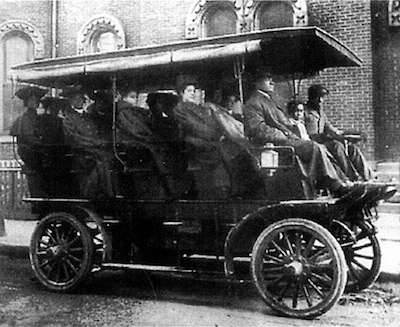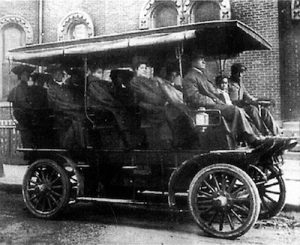
The company was founded to provide safe and comfortable accommodations for Nashville’s black residents. Capitalized initially at $25,000 sold in shares of $10 each, the company founders included some of the city’s most prominent business and political leaders, including businessman Preston Taylor who was served as the first president, City Councilman James C. Napier, and prominent surgeon and Meharry professor C. Victor Roman. Other founding investors included Bishop Evans Tyree, George W. Washington, William D. Chappelle, Luke Mason, T.G. Ewing, J.W. Grant, H.T. Noel, A.T. Sanders, J.G. Merrill, Robert Robertson, and William Beckham. George W. Henderson was the treasurer, and Richard Henry Boyd served as the company’s purchasing agent.
The Union Transportation Company was organized to provide a convenient transportation alternative for black passengers and to carry freight throughout the cities and towns of central Tennessee. The company bought five large (fifteen-passenger) stream-propelled automobiles and took an option to buy twenty more vehicles. The autobuses arrived in Nashville on September 29, 1905, and the dedication ceremonies were held in Watkins Park on October 2, 1905. The regular lines of travel were started on Tuesday, October 3, 1905. Four of the five cars were in constant service, with a fifth car held in reserve.
The Union Transportation Company soon experienced problems. The stream-propelled buses lacked adequate power to traverse the steep grades of Nashville’s terrain and keep regular schedules. The company responded by trading in the original steam-powered vehicles for fourteen electric automobiles that carried twenty passengers each. In January 1906, the company put its electric cars into operation.
After its automobile batteries were ruined by overcharging at the Nashville Railway and Light Company facilities, which some believed was a deliberate act of sabotage, the Union Transportation Company installed its own dynamo and electric generating equipment at the facilities of the Nashville Baptist Publishing House, one of the largest black businesses in the city.
Despite these efforts, the demise of Union Transportation Company followed quickly. The initial enthusiasm driven by the black community’s boycott of city bus lines faded, along with the novelty of riding on black company-owned automobiles. Also by early 1906, subscriber stock purchases declined, despite the need for capital to maintain this enormous financial undertaking. In April 1906, the city of Nashville initiated its plan to levy an annual privilege tax of $42 per car. These taxes and persistent battery trouble caused the company to cease operation by mid-summer. In 1907 the Union Transportation Company sold its remaining automobiles to the Jamestown Exposition celebrating the 300th anniversary of the founding of the Virginia colony. Later that year, the Union Transportation Company ceased its operations.
– See more at: http://www.blackpast.org/aah/union-transportation-company-1905-1907#sthash.JIMNksKD.dpuf

